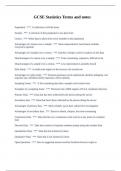Population *** A collection of all the items
Sample *** A selection of the population to use data from
Census *** When data is taken from every member in the population
Advantages of a census over a sample *** More representative, less biased, includes
everyone's opinions
Advantages of a sample over a census *** Quicker, cheaper, easier to analyse as less data
Disadvantages of a census over a sample *** Time consuming, expensive, difficult to do
Disadvantages of a sample over a census *** Less representative, possibly biased
Pilot Study *** A small scale replica of the survey to be carried out.
Advantages of a pilot study *** Ensures questions can be understood, identify ambiguity, test
response rate, identifies likely responses, check methods
Sampling Frame *** A list containing data that a sample can be taken from
Examples of a sampling frame *** Electoral role, SIMS register, DVLA, telephone directory
Primary Data *** Data that has been collected by the person doing the survey
Secondary data *** Data that hasn't been collected by the person doing the survey
Advantages of primary data *** More reliable, up-to-date, tailored for investigation
Advantages of secondary data *** Easier to obtain, cheaper, less time-consuming
Continuous Data *** Data that lies on a continuous scale (can be at any point on a number
line)
Discrete Data *** Data that consists of separate numbers (jumps along the number line)
Quantitative Data *** Data that has numerical values
Qualitative Data *** Data that is not numerical values
Open Questions *** Has no suggested answers and has freeform boxes to reply in
, Advantages of open questions *** Allows for a range of responses, so can cover all
eventualities
Closed Questions *** Has a set of answers for the person to choose from
Advantages of closed questions *** Easier to analyse as range of responses restricted
Leading Questions *** Questions that infer an opinion and promote a certain answer
Convenience Sample *** The first so many pieces of data in the list are sampled
Advantages of a convenience sample *** Quick and easy
Disadvantages of a convenience sample *** Unlikely to be representative
Random Sample *** Each person has an equally likely chance to be picked
How to take a random sample *** (a) Number everyone in list
(b) Use a random number generator to select numbers
(c) Select the data points corresponding to the numbers picked
(d) If you get a number outside the range or the same number twice you repeat, if you get a
decimal round to the nearest number.
Advantages of a random sample *** Easy to do
Disadvantages of a random sample *** May not be representative
Systematic Sample *** Data is chosen at regular intervals (e.g. every 10th person)
How to take a systematic sample *** Order population and divide population by sample size to
find how often data chosen. Then choose random number to decide where in this interval to start.
Advantages of a systematic sample *** Useful for production line - will spot problems over
time
Disadvantages of a systematic sample *** May not be representative
Quota Sample *** The same amount of people from different chosen groups are sampled
How to take a quota sample *** Decide on a quota size for each group. Then take a random
sample, ignoring any results from a group where the quota has been reached.
Advantages of a quota sample *** Makes sure all quota groups are represented, easy to take



